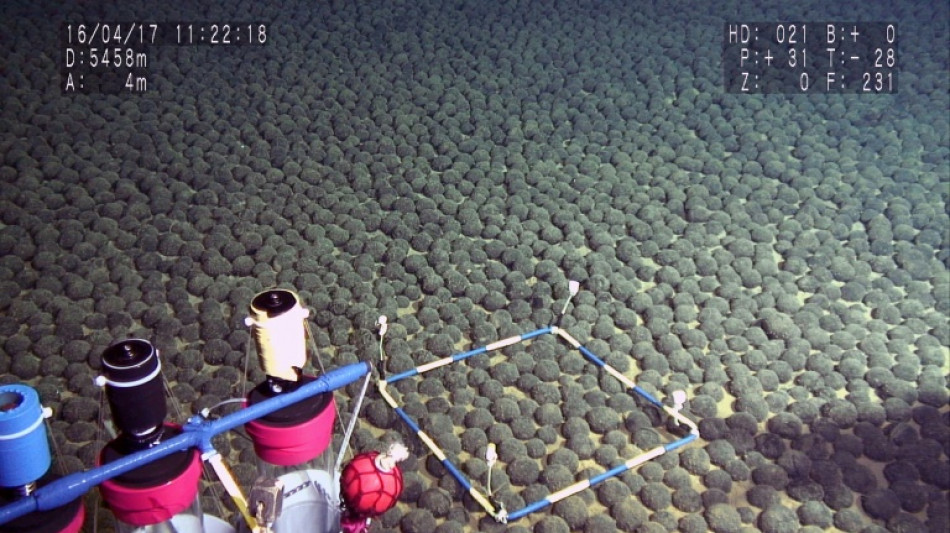
-
 Club World Cup riches await four African challengers
Club World Cup riches await four African challengers
-
Three key battles in World Test Championship final

-
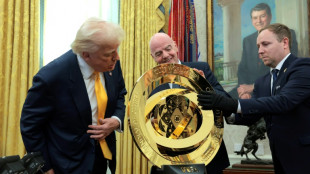 FIFA's Club World Cup finally faces the ultimate test
FIFA's Club World Cup finally faces the ultimate test
-
Indonesia revokes most mining permits in dive hotspot after outcry
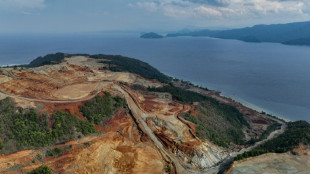
-
 Madrid to host grand prix as Formula One announces 2026 calendar
Madrid to host grand prix as Formula One announces 2026 calendar
-
Australian mushroom murder suspect denies covering tracks

-
 Relatives struggle to find last 1,000 Srebrenica victims 30 years on
Relatives struggle to find last 1,000 Srebrenica victims 30 years on
-
Ezra Collective's infectious energy defies jazz 'elitism' to win new fans

-
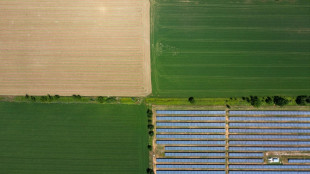 Sunny Greece struggles with solar energy overload
Sunny Greece struggles with solar energy overload
-
Ukraine says 'massive' Russian drone attacks hit Kyiv, Odesa

-
 Trump's cuts are 'devastating' for vulnerable women worldwide: UN
Trump's cuts are 'devastating' for vulnerable women worldwide: UN
-
Trump must tell Netanyahu 'enough is enough': ex-Israeli PM

-
 Panthers maul Oilers in stormy clash to lead Stanley Cup Final
Panthers maul Oilers in stormy clash to lead Stanley Cup Final
-
Asian markets extend gains as China-US talks head into second day
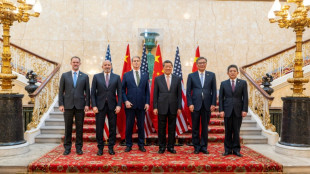
-
 Ukraine says 'massive' Russia drone attacks hit Kyiv, Odesa
Ukraine says 'massive' Russia drone attacks hit Kyiv, Odesa
-
Canadian teenager McIntosh smashes 200m medley world record

-
 Two BTS megastars released from South Korea military
Two BTS megastars released from South Korea military
-
Auckland City's amateurs take unpaid leave for Club World Cup adventure

-
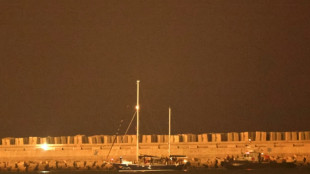 Israel says Gaza-bound aid boat activists awaiting deportation
Israel says Gaza-bound aid boat activists awaiting deportation
-
China carefully assembling a deep-sea mining strategy
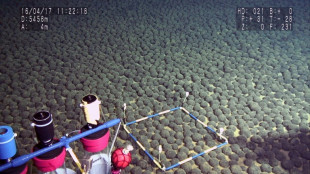
-
 With shades of Man Utd, Urawa vow to bring the noise at Club World Cup
With shades of Man Utd, Urawa vow to bring the noise at Club World Cup
-
Two of K-pop's BTS megastars released from military service

-
 Helium One Global Ltd Announces Galactica Project Update
Helium One Global Ltd Announces Galactica Project Update
-
ANGLE plc Announces Novel Discoveries Into the Biology of Cancer

-
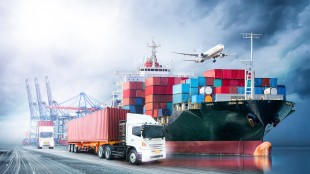 Helium One Global Ltd Announces Introduction of Employee Benefit Trust Scheme
Helium One Global Ltd Announces Introduction of Employee Benefit Trust Scheme
-
RFK Jr ousts entire US vaccine panel over alleged conflicts
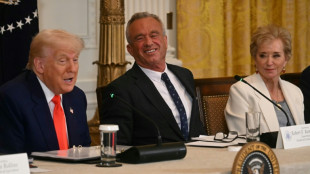
-
 Patience and discipline needed for US Open at difficult Oakmont
Patience and discipline needed for US Open at difficult Oakmont
-
US health secretary dismisses entire vaccine advisory panel
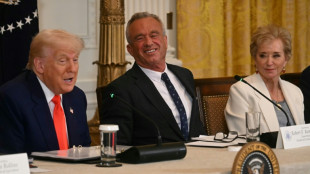
-
 US judge dismisses actor Baldoni's lawsuit against Lively, NYT
US judge dismisses actor Baldoni's lawsuit against Lively, NYT
-
Trump deploys Marines as tensions rise over Los Angeles protests

-
 Jurors making 'good progress' towards Weinstein retrial verdict
Jurors making 'good progress' towards Weinstein retrial verdict
-
World Cup 2026 host cities say fans 'welcome'

-
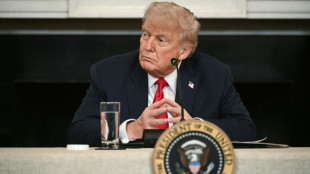 Trump warns of decision time as Iran prepares nuclear counter-proposal
Trump warns of decision time as Iran prepares nuclear counter-proposal
-
Sly Stone: soul music's groundbreaking, elusive superstar

-
 Back after first major win, Johnson again seeks top form at Oakmont
Back after first major win, Johnson again seeks top form at Oakmont
-
Belgium battle past Wales, Italy win in World Cup qualifying

-
 De Bruyne secures Belgium win over Wales in seven-goal thriller
De Bruyne secures Belgium win over Wales in seven-goal thriller
-
Global stocks mixed as markets eye US-China trade talks

-
 Rodin 'copy' sells for $1 million in France
Rodin 'copy' sells for $1 million in France
-
Italy beat Moldova as troubled Spalletti era comes to an end

-
 Funk-rock pioneer Sly Stone dead at 82
Funk-rock pioneer Sly Stone dead at 82
-
US, China trade talks to stretch into second day

-
 K-pop's BTS members set for military service release
K-pop's BTS members set for military service release
-
Dhoni, Amla and Graeme Smith added to ICC Hall of Fame

-
 Apple plays it safe on AI despite Wall Street pressure
Apple plays it safe on AI despite Wall Street pressure
-
Military aids evacuations as Canada wildfires expand eastward
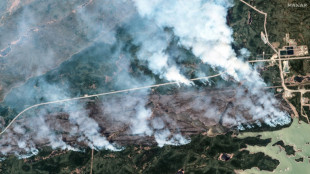
-
 Looser gun laws tied to thousands more US child shooting deaths
Looser gun laws tied to thousands more US child shooting deaths
-
Gaza-bound aid boat carrying Greta Thunberg reaches Israeli port
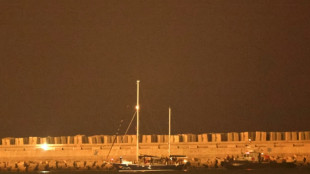
-
 Warner Brothers Discovery will split company to build streaming
Warner Brothers Discovery will split company to build streaming
-
Kenya's plus-size fashion show says 'big is beautiful'


China carefully assembling a deep-sea mining strategy
In a world hungry for crucial resources, China may not be poised to start deep-sea mining but it is planting seeds for such operations in a meticulously planned economic and geopolitical strategy.
The world's oceans, both international waters and those under national jurisdiction, are rich in minerals and metals, like cobalt, nickel and copper.
These are important for building electric car batteries, for instance, and other technologies as countries try to transition away from fossil fuels.
China "is an energy-thirsty country. It will look for resources everywhere," including the deep sea, said Julia Xue of Shanghai Jiao Tong University.
But she said China is not particularly anxious over the issue, although recent developments -- one company is itching to be the first to start mining the sea bed -- may put more pressure on Beijing.
A Canadian firm, The Metals Company, has filed an application with the United States to begin undersea mining in international waters.
Using its American subsidiary, it acted after President Donald Trump, bypassing international negotiations, signed an executive order in April to speed up the permit-issuing process for such mining in US and international waters.
Trump cited an obscure 1980 US law that says American citizens can explore for and recover deep sea minerals in areas beyond the country's jurisdiction.
Environmental groups are outraged by Trump's order, arguing that a wild hunt for the potato-sized, metal-containing nodules could harm fragile undersea ecosystems.
The Canadian company initially said it would submit its request to the International Seabed Authority (ISA), a body which has jurisdiction over the ocean floor in international waters.
The Metals Company says it ignored this authority because of its slow pace in talks on adopting a mining code that establishes rules for exploiting seabed resources. The United States is not an ISA member.
A long-time observer of those talks who spoke on condition of anonymity said China is not particularly worried about who starts mining first.
"For them it's more about dominance, staying competitive in the game, and giving the impression that you can't mess with us," the observer said.
With that goal in mind "they're definitely developing the technology and putting the strategic agreements in place," Alex Gilbert, a researcher at the Payne Institute for Public Policy at Colorado School of Mines, told AFP.
For instance, China has reached an agreement with the Cook Islands to explore for minerals in that Pacific country's waters.
Another tiny Pacific nation, Kiribati, also says it is exploring a deep-sea mining partnership with China.
This approach is "more geopolitical than economic," said Emmanuel Hache of the French Institute for International and Strategic Affairs, noting Beijing is using undersea mining as a lure to cement greater diplomatic support as it exerts power.
China holds five contracts handed out by the ISA to look for resources in the Pacific and Indian Ocean sea beds and these contracts cover all types of undersea mineral resources. China's is the largest number of the 22 contracts the organization has granted.
- Years behind -
"From a research perspective, we have been continuously getting closer. And from a technical perspective, we have been continuously improving," said Chen Xuguang, a researcher at Ocean University of China.
In 2024 a Chinese prototype deep-sea mining vehicle called Pioneer II, developed by Shanghai Jiao Tong University, set a national record by operating at a depth of more than 4,000 meters (13,100 feet).
State-owned Beijing Pioneer Hi-Tech Development Corporation told AFP that later this year it plans a seabed nodule collection test.
Still, China is not as advanced technologically as The Metals Company, experts say.
"I would characterize China as being two to four years behind them in terms of their technology," said Gilbert in Colorado.
Hache, the French expert, put the gap at five years.
But China has an advantage over firms like the Canadian one in recovering and processing nodules: its companies are supported by the state and China has infrastructure for processing metals.
The observer of the international seabed talks said China does not need seabed mining for metal supply, "but maybe geopolitically, in the context of maintaining their control over the commodities market."
China wants to keep its options open, this person said.
And while it supports an international mining code, China does not need one now and "they're not going to put pressure until they've decided strategically that they're ready," said Gilbert.
P.Martin--AMWN